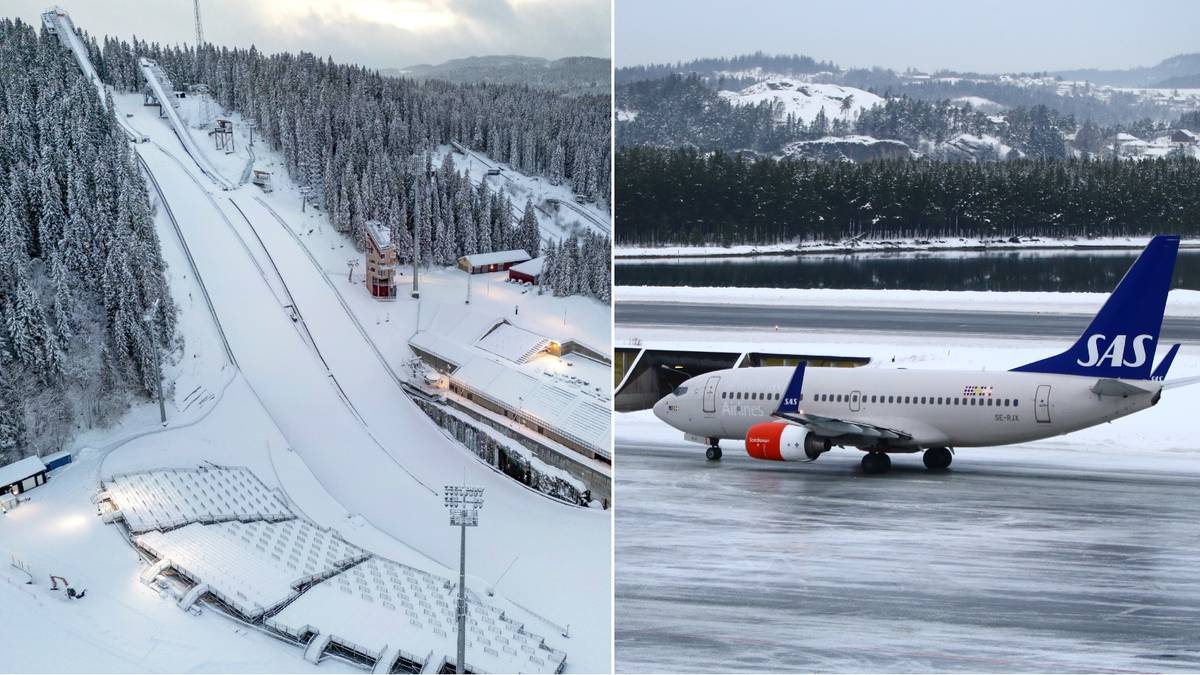
Trondheim Ski World Championships Claim to Be the Most Sustainable Ever – But Flight Emissions Are Under Fire
Originally published in NRK on February 01, 2025
It is a sad fact that ski sports are threatened by a warming climate and a lack of snow. The Ski World Championships in Trondheim have taken note of this and proclaim that they will be the most sustainable ski world championships ever – nothing less.
“We want to be more than just ski races. We also want to steer ski and winter sports in a more sustainable direction,” says Ola Rønning to NRK.

CHIEF FOR SUSTAINABILITY: Ola Rønning is proud of the championship’s climate measures.
Photo: Morten Waagø / Morten Waagø
In the mild winter weather, the head of sustainability at the Ski World Championships is seen at Granåsen inspecting the construction of the VIP tents which are nearing completion. He is proud of how the championships are organizing an environmentally friendly event – what he calls the biggest victory is yet to come.
Heating with Wood Briquettes
In Spongdal, just outside Trondheim, 300 cubic meters of wood chips have been pressed into briquettes about the size of snuff boxes. The smell of fresh wood fills the storage room where these piles are kept. These briquettes will provide eco-friendly heat to the VIP tents and lavvoes that are currently being set up in the Granåsen arena.
- Briquettes: Ketil Hagen at Pilot Anlegg shows the wood chip storage in Spongdal.
- Briquettes: The wood briquettes are made from chips sourced in Surnadal.
- The Furnace: A furnace filled with these briquettes will heat the tents at Granåsen.
“Compared to heating with diesel, using wood briquettes will save 750 tonnes of CO₂,” explains Rønning.
That is equivalent to 441 round-trip flights for one person from Oslo to New York.
The Sustainability Claim Under Scrutiny
Not everyone is impressed by these measures or by the slogan of becoming ‘the most sustainable Ski World Championships ever’. Stig Schjølset, the managing director of the environmental foundation Zero, acknowledges that eliminating diesel generators is a significant improvement with great environmental benefit. However, he points out that the issue of air travel remains a major contributor to greenhouse gas emissions during large events.
In total, around 6000 accredited persons are expected to arrive in Trondheim. Information from 10 major national federations indicates that most athletes and support staff will fly into Trondheim with a connection in Oslo – none are reported to fly into Oslo and then take the train, except for Sweden which has consciously chosen not to fly.
According to Avinor, there is an expected 13 percent increase in passengers at Værnes during the first week of the championships compared to the same week last year.

Calls for Documentation
Schjølset doubts that Trondheim 2025 can truly be the most sustainable Ski World Championships ever. He stresses that if such an ambition is proclaimed, the organizers must document exactly what Trondheim has achieved compared to previous championships.
“It’s very good that Trondheim has ambitions to make the event as eco-friendly as possible, but it is unfortunate to use unverified claims to market sustainability,” Schjølset tells NRK.
The criticism is mainly aimed at the large number of flights to and from the event, which remain the biggest source of emissions despite local efforts.
“When it comes to air travel, we are still relying on fossil energy, and that results in high emissions. It is the flights of both participants and spectators that will determine whether this championship is truly climate-friendly,” he adds.
Additional Environmental Initiatives
The article also outlines further sustainability efforts planned for the event:
- Public Transport: The local bus company AtB will shuttle spectators between the city center and Granåsen using a fleet that includes electric buses, biogas buses, and 23 diesel buses.
- Event Vehicles: The championships will use 20 electric buses for transporting athletes, support staff, and volunteers, as well as 100 electric cars.
- Train Promotion: There is an effort to promote the use of SJ’s “Championship Train” between Oslo and Trondheim, although some services have been cancelled due to partial closures of the Dovre Line.
- Catering: Local, short-sourced food will be served at the arena.
Backing Down on Overambitious Claims
Trondheim is not the first to label its event as the most sustainable ever – even the 2014 Sochi Winter Olympics claimed to be ‘in harmony with nature’ despite significant environmental impacts. Critics like professor Sven Daniel Wolfe of ETH in Zürich warn against such hyperbolic claims, describing them as marketing gimmicks or greenwashing.
“The problem for me is this hypocrisy in declaring that the event does no harm when in fact it does,” says Wolfe. He argues that sports organizers will always claim to be the best and greenest, but the focus should be on measurable improvements rather than empty slogans.
When asked about some of the more ambitious statements that have since been removed from the event’s website (such as claims of zero emissions for accredited participants), Ola Rønning explains that the original wording was a mistake. He emphasizes that the goal remains to ensure fossil-free transport once the participants arrive in Trondheim, and asserts that they are committed to a comprehensive approach to sustainability that goes beyond just climate and environmental concerns – it also includes health, inclusion, and equal opportunities (as exemplified by the introduction of a new para cross-country event).
Response from Experts
Professor Wolfe, who attended a conference in Trondheim last year, acknowledges the positive measures being taken but cautions against overusing terms like “most sustainable ever”.
“I think it’s problematic to use that term because it isn’t true. It’s more about marketing and greenwashing than actual results,” Wolfe says.
Ola Rønning concludes by stating, “Ski World Championships in Trondheim do not single-handedly save the world, but by measuring everything we do, we can learn and ensure that future events are even better.”
Published 01.02.2025, 12:31 and updated 01.02.2025, 13:06
See Also
The Future of Nordic Competitions: Insights from Championship Chief Åge Skinstad
March 04, 2024 / SVT Sport


Trondheim Mayor Claims Closure of Dovrebanen Could Impact Ski World Championships
February 01, 2025 / NRK
100,000 Tickets Sold for Ski World Championships in Trondheim
October 09, 2024 / SVT Sport